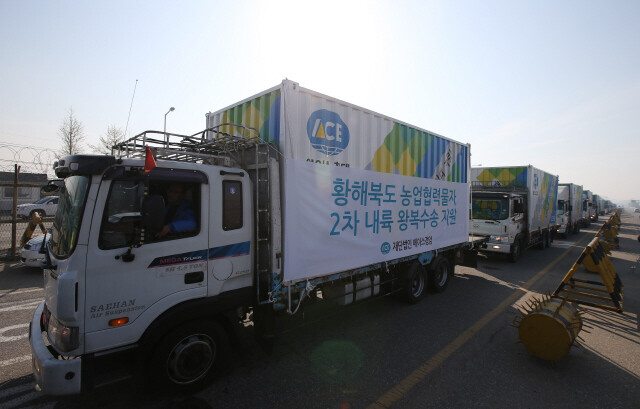hankyoreh
Links to other country sites 다른 나라 사이트 링크
S. Korea moving away from large scale aid to North Korea

The South Korean government has decided to stop providing large-scale aid to North Korea annually, which often included as much as 400,000 tons of rice and 300,000 tons of fertilizer. Instead, it plans to recalibrate its North Korean aid efforts to individual development and cooperation projects spearheaded by the private sector in the areas of public health, agriculture and stockbreeding, and forestry.
“We will overhaul the current budget system for the Inter-Korean Cooperation Fund, moving from organization-based aid by the government, the private sector, and international organizations to project-based aid starting with the 2016 budget,” a Ministry of Unification official said on July 27. This will end budget allocations for food aid and fertilizer aid to North Korea, which are classified as government assistance.
In the future, budget allocations will be made in the categories of young children and public health, agriculture and stockbreeding, and forestry.
The Ministry is moving to adopt the model of the Ace Gyeongam Foundation, which provided 15 tons of fertilizer assistance in an agriculture cooperation project in North Hwanghae Province last April.
Between 1995 and 2007, South Korea provided a total of 2.03 trillion won (US$1.74 billion) worth of rice (2.66 million tons) and fertilizer (2.55 million tons) to North Korea. This accounted for 62% of the 3.28 trillion won of aid given to North Korea over this period.
But when Lee Myung-bak was elected president in 2008, large shipments of rice and fertilizer were discontinued in response to a controversy about giving unconditional aid to North Korea. Now the government intends to write that policy into the system, starting with the budget allocation for the Inter-Korean Cooperation Fund.
“We took into account the fact that North Korea, which is no longer dealing with an extreme food shortage, is more interested in development projects than in material assistance,” the Ministry of Unification official said.
But experts are concerned that the government is moving to discontinue the food and fertilizer assistance without thoroughly considering its full ramifications in order to avoid criticism from conservatives about unilateral aid to North Korea.
“Large-scale rice and fertilizer assistance has given North Korea an incentive to engage in high-level talks and reunions for divided families. It is short-sighted to end this assistance when inter-Korean relations are already strained. It is a rash move to announce the end of government-level aid while North Korea still faces a food shortage,” said Kang Yeong-sik, secretary general of the Korean Sharing Movement.
“North and South Korea need to sit down at the table to explore ways to lift the May 24 Measures and to provide assistance for the drought,” said Kim Chang-soo, director of research at the Korea National Strategy Institute.
By Kim Ji-hoon, staff reporter
Please direct questions or comments to [english@hani.co.kr]

Editorial・opinion
![[Column] Season 2 of special prosecutor probe may be coming to Korea soon [Column] Season 2 of special prosecutor probe may be coming to Korea soon](https://flexible.img.hani.co.kr/flexible/normal/500/300/imgdb/original/2024/0426/3317141030699447.jpg) [Column] Season 2 of special prosecutor probe may be coming to Korea soon
[Column] Season 2 of special prosecutor probe may be coming to Korea soon![[Column] Park Geun-hye déjà vu in Yoon Suk-yeol [Column] Park Geun-hye déjà vu in Yoon Suk-yeol](https://flexible.img.hani.co.kr/flexible/normal/500/300/imgdb/original/2024/0424/651713945113788.jpg) [Column] Park Geun-hye déjà vu in Yoon Suk-yeol
[Column] Park Geun-hye déjà vu in Yoon Suk-yeol- [Editorial] New weight of N. Korea’s nuclear threats makes dialogue all the more urgent
- [Guest essay] The real reason Korea’s new right wants to dub Rhee a founding father
- [Column] ‘Choson’: Is it time we start referring to N. Korea in its own terms?
- [Editorial] Japan’s rewriting of history with Korea has gone too far
- [Column] The president’s questionable capacity for dialogue
- [Column] Are chaebol firms just pizza pies for families to divvy up as they please?
- [Column] Has Korea, too, crossed the Rubicon on China?
- [Correspondent’s column] In Japan’s alliance with US, echoes of its past alliances with UK
Most viewed articles
- 1Samsung subcontractor worker commits suicide from work stress
- 2Division commander ordered troops to enter raging flood waters before Marine died, survivor says
- 3‘We must say no’: Seoul defense chief on Korean, USFK involvement in hypothetical Taiwan crisis
- 4No good, very bad game for Korea puts it out of Olympics for first time since 1988
- 5[Column] Season 2 of special prosecutor probe may be coming to Korea soon
- 6[Editorial] Korea’s surprise Q1 growth requires objective assessment, not blind fanfare
- 7Korea’s 1.3% growth in Q1 signals ‘textbook’ return to growth, says government
- 8US overtakes China as Korea’s top export market, prompting trade sanction jitters
- 9[Column] Has Korea, too, crossed the Rubicon on China?
- 1046% of cases of violence against women in Korea perpetrated by intimate partner, study finds